- Home
- Dusty Richards
Valley of Bones Page 2
Valley of Bones Read online
Page 2
Spencer’s wife Lucinda and her two children were moved to the Prescott Ranch and two ranch girls were hired to help her. She cried at the parting but told him to go help Chet and thanked Chet for selecting him. The onetime widow of a Diablo Ranch hand killed during roundup made his man Spencer a good wife. Liz promised him Lisa would educate Lucinda while her man was gone. Spencer had sung Lucinda’s praises in helping him get the wire up in record time.
The three took the train from southwestern New Mexico to Fort Worth. With passenger trains restrained to 20 mph because of the danger of wrecking, the trip proved lengthy. They rested a day and a night in a Fort Worth hotel and then climbed the passenger car steps to continue the clacking, rocking way of trains to finally descend at the busy central train depot in Washington, D.C.
A man from the U.S. Marshals office met them at the impressive depot building.
“Nice to have you here sir. My name is Harry Nelson. I am your guide here. Chief Marshal Kenneth Samuels send his best regards and said to tell you he appreciates all your work to bring down crime in the territory.”
“Things are slowing out there, I think,” Chet assured him.
They went to the hotel and their rooms proved to be as hot as the rest of D.C. Hot and humid as hell. Chet felt the humidity made it worse than any desert oven heat. There was some ice tea and water served to them in the fancy restaurant where the cost for a meal would have fed a family for two weeks or longer in Arizona.
They attended meetings in high-ceilinged rooms with important members of Congress, along with the law agency representing the Navajo tribe, Jacobs, Sorrels, and Rhodes. Congress members were anxious to get out of the D.C. heat, and wanted all put off until the fall session. Chet saw no chance of them allowing the Navajos to handle the coal business. Spencer learned that the Tucson Ring also had a man, or more, spreading rumors to any official who would listen that the Navajo would only buy guns and bullets if they had the money from the mine business. They pushed on how well white business members would handle the coal business and better serve the railroad than a band of Indians who would mess around and cause delays that could hurt many of the businesses using the railroad.
The main man who was heading the others in the dissidence was a man by the name of Archie Thrasher. Spencer pointed him out in the hotel lobby, and Chet cornered him.
“You Archie Thrasher?”
The big man turned to study him as if Chet was less than dirt. “Well, you must be Marshal Byrnes. How are your blanket-assed Indians doing?”
“The Navajos are not blanket-assed Indians. They would do a lot better if you and your crooked schemers stayed out of messing with them.”
“It is obvious to anyone with a lick of sense that those uneducated Indians could not work any mining operation nor deliver coal to the tracks on time for the trains. It would then make big problems for shippers, especially those with food products that would spoil while waiting for the coal to be delivered.”
The man behind the bushy graying mustache needed a fist in his face, but Chet held his temper. “I suppose the people who have controlled all the crooked business in southern Arizona think they can do it better and plan to steal the coal from the Navajo.”
“You need to prove that statement.”
“No. More congressmen need to read the nonrefundable beef contract that your outfit has with the reservations and you’d be out of business.”
“Listen, your shoddy outfit is not going to continue delivering beef right to the Navajos.”
“I beg your pardon.” Chet was opening and closing his fists at his side.
“Thrasher, I recommend you apologize to Chet,” Spencer said. “Everyone knows the bony cattle your operation delivers. The beef we deliver is always in good condition.”
“Well, you won’t be doing it much longer. I can inform you of that. We intend to win the next bid on the Navajo beef account.”
“Thrasher, your reputation at that will not sway anyone to accept your bid. You have tried it before and failed miserably.”
“You wait and see. Your days as a supplier of their beef will be over shortly.”
Thrasher gave them a snort and stalked out of the lobby.
“I may just shoot that bastard,” Chet said. “When we get home I want him and all his kind put in that prison they are planning for Yuma.”
“I have seen you angry before, but I believe that man made you real mad.”
“Spencer, he did. For years, Old Man Clanton’s sorry beef supplying has grated on me as crooked business that goes on unchecked. But I think we had better cover our butts and look into what they are planning to do to get the contract from us.”
“You are to meet the Navajo lawyers and the chief tomorrow?”
Chet nodded. He still felt his heart beating hard in his chest as he tried to calm down. Before he was through he hoped and planned to uncover enough corruption being done by the Tucson Ring to shut them down forever.
Liz knew he was still upset when they met upstairs in the hotel room. “What went wrong?”
“Spencer and I just got off meeting a man, Thrasher, who told us he would have the Navajo beef contract shortly.”
“Can he do that?”
“He belongs to the Tucson Ring, and that bunch might try anything. They get by with wholesale corruption down in the South now.”
“What can you do?”
“I will talk to the people at the Indian Bureau and see what they know.”
She threw her arms around him and hugged him. “I know when you are mad, and I read that like a clock when you walked in that door.” Really, anyone could tell Chet’s mood immediately, by the look on his face. “You will meet with Chief Manuelito tomorrow?”
“Yes, he and the lawyers. Sarge has met him several times taking cattle over there. He says the chief is a really smart man.”
“That is why we are here, right?” Liz asked.
“Yes. Blue Bell asked us to come help him set up the mining deal so the Navajos could move into our world as businessmen.”
Liz looked away and shook her head. Chet knew she thought he and the tall Navajo woman had had an affair, but it never happened. Not that the woman was not attractive. He had met Blue Bell on his wagon trip over the Marcey Road from Texas when her horse had died while she was traveling home. He gave her another horse, and before she rode off, they had long talks about her concern and efforts for her people. This was what guided her. She would not be associated with a white man. He heard that her people were starving. He sent them beef and other foods, and continued to feed them. Now all he wanted was to help her and her people find a place in the world. They respected one another.
Even Jesus once asked him confidentially if the two of them ever had an affair. Chet had told him no and that the reason was she was too involved in her people for that to happen.
The next day’s meeting with the chief in his hotel room was a warm one. Manuelito, a tall Navajo in great physical shape, wearing his blanket, was seated in a large chair. He rose and greeted Chet with a handshake.
Chet introduced Spencer and he shook his hand. Two chairs were delivered, facing the chief, for them to sit on.
“Do you miss the cool winds of Prescott?” the chief asked.
Chet chuckled. “Yes. Very badly. Like you do the winds of Heaven in the Sky.”
Manuelito’s eyelids closed some and he nodded, his mouth tight, before he said, “This is a very poor place to live.”
“I agree. What do your lawyers think about the coal mining chances?”
“There are many people who are afraid the Navajos might make a success of the business. They do not want this. ”
“There could be money made selling coal.”
The chief held up his index finger. “Money rules all here, doesn’t it?”
“I am sure it does. Have you heard of a man named Thrasher?”
“Yes. He lives in Tucson.”
“He says they will take my beef contract away
from me.”
The chief shook his head. “Money, huh?”
“They didn’t deliver in the first place, which was why I got that contract.”
“The Indian agent said he never wanted them back. Your handling of it is the smoothest thing that happens for him.”
“Please keep an ear to it. If things change, I would like to know. And I will keep talking to as many as I can to let you have the coal business.”
“You deliver good beef on time. You have helped one of my people get a stage stop and have hired my people to string the wire. Now you help with this. We are amigos, Chet Byrnes.”
“I have a few more meetings to talk to people about your Navajo coal business. I have a feeling someone made a deal under the table, but we won’t know what until things start to happen.”
“We have several white men squatting on the reservation. They say it is federal land and they can homestead it. It is not federal land. The great white chief gave us that land in our treaty. I think they are waiting for something to happen, then they will do something. I know not what, yet.”
“Won’t the army make them leave?”
“Sometimes. But they come back.”
“You need me, send a telegram. I know about this now.”
Manuelito smiled. “Thanks once more. Again, you are proving you are a friend to us.”
“Nice to meet you, sir.” Spencer said.
“You ride with a good man. You two be careful. That Thrasher may have a plan to kill you.”
“He better not try unless he has his funeral suit on,” Chet said as they left.
They took a taxi to the Indian Bureau and met with the head of the bureau, Henry Hampton, and his staff.
“Thanks for this meeting,” Chet said. “This is my man Spencer. Since we came here we have been threatened with loss of our cattle contract to a Tucson consortium. Is that true?”
“No,” Hampton said and laughed. “We have to deal with that same outfit in southern Arizona, but no one at the agency in Gallup wants any part of their underhanded ways. Your reputation and what you get done down there is the best in the business. In fact we’d like another supplier down there.”
“My ranch on the border would be glad to fill any other beef contracts you need filled.”
Hampton asked one of his deputies when the contract would be available.
“Two years. That Tucson bunch has a Texas congressman who orders us to deal with them.”
“I understand but, if for any reason that breaks earlier, I will have enough numbers to fill your needs.”
“Good to know.”
“We have talked to congressmen and other committees. I am afraid, so far, I have done little good for the Navajos and their coal mine operation. I can’t stay any longer. I have several ranches to operate and plan to go back to Arizona quickly.”
“I understand you serve as a U.S. Marshal also?”
“We handle their rough cases. Arizona needs to improve to ever become a state. Crime gets lots of coverage across the U.S., and we get our share of newspaper articles on those that happen in our region. People think we have some kind of a climate that spawns it. We don’t, but yes, there is lots of law enforcement work being done.”
“Good luck on statehood. And keep up the good work of supplying us your good beef.”
“Thanks. Ranchers in northern Arizona appreciate the beef contract. It isn’t only our ranches, but many individuals sell us cattle to fill that contract.”
Chet and Spencer shook hands around the room and left.
“Boss man, it does not sound like they want Thrasher back again at Gallup.”
“You are right. But money talks. We need to listen close.”
Spencer nodded.
There were so damn many things to keep up to date and informed on. He felt disappointed with their results but hoped he was doing well enough to have some success, somewhere along the line. The people in D.C. never bothered to go out west to check on anything. It was always up to him to go to them, if he wanted something done. Congress was going home that Friday. Laws, to be repealed or passed, would wait until cooler days on the Potomac. Chet was ready for the creosote desert and cool turpentine smell of the high country. This busy place with tailored suits and top hats was not where he belonged, for damn sure.
Chapter 3
There must have been some kind of a bug in the air. Many people in the passenger cars were vomiting on the train ride across east Texas. The nauseating stench and the rocking motion only brought more people upchucking from the open windows, or onto the aisle floor heading for the rest rooms.
Even standing on the porch over the hitch between cars, the sour smell saturated the air and burned Chet’s nose. Liz had a short spell of it. Spencer looked as upset as Chet felt. He wondered if he’d throw up any minute. What made them so sick and why so many? Probably never be an answer. The conductor was as white as a ghost and the two black porters gave up mopping to join the bunch on the steps throwing up on the tracks.
Totally exhausted, they departed the train at Fort Worth and found a good hotel. They had baths drawn and their clothes sent out to be laundered while they settled down. After putting on clean clothing from their bags, they ate supper at a fine restaurant. Liz said, “I think I can still smell that train ride.”
“I was on a boat one time in the Gulf and I got seasick, but this was worse than that,” Spencer said.
“I have to say it was different. I think it was a chain reaction. Someone got sick and more were added until all of us were sick.” Chet said.
The others agreed.
“That whole Washington, D.C., deal bothers me. I never was in a fight where I felt so helpless. And no one I found wanted to help us. That really was a disappointment. Like they knew it all. Wouldn’t listen or didn’t want to listen to our side of the Navajo deal. You’d think people would agree that anything to make the Navajo self-sufficient would be a good deal.”
“We did strike out,” Spencer said.
“Blown out was more like it.”
“What next?”
“Go home. Tend to our businesses and forget about it.”
“You think Thrasher has enough pull to get the Navajo beef contract from you?”
“I don’t doubt anything that Tucson Ring can do, but we now have a good record of the way we are handling it, and we were told Gallup does not want any changes.”
“I want to tell you, you two are not heroes in D.C. and, unfortunately, we did not help anything,” Liz said.
“Well, business as usual in the territory.”
“I certainly hope so.”
“We better get back on the train tomorrow and move on to San Antonio.” She laughed. “And hope we don’t get on a sick one again.”
Both men agreed.
They arrived in San Antonio, with no issues, and took the westbound railroad for New Mexico. West Texas floated by over the clack of the rail joints and still no sickness. Four days later they were rocking in the stage for Tucson passing the towering Chirichua Mountains, headed for the next stage stop that side of Benson.
Both men wore their guns, as uncomfortable as they were, seated in the bench seats. The hot summer sun was baking them in the dusty interior when they rode through the boulder-strewn Texas Canyon.
A shot was fired and the driver, alone on the box, halted the double team with a loud “Whoa.”
Both men had their guns out.
“Get flat on the floor,” Chet told his wife.
“Give me a gun.”
Spencer, already on his knees, handed her a small. 30 caliber pistol from his vest.
“How many on your side?” Chet asked.
About then one of the holdup men demanded they come out with their hands high.
Wrong request.
Both men came out shooting. Chet took the right side, and shot who he thought was the leader in the chest. The man’s rifle went off harmlessly in the air and his horse crashed into the other holdup ma
n. Spencer was firing away on his side of the coach and horses screamed. The driver fought the two teams to hold them from running away.
Chet shot a fleeing robber’s horse, and he went nose over in a flip, sending his rider into the dust, his own horse trampling him. Another man, trying to escape on foot, was ducking uphill through tall boulders, but Chet’s last bullet took him square in the back. He screamed and went facedown.
“You all right, Spencer?” he shouted.
The driver holding up the reins spat over the side. “He’s fine. They ain’t. I never seen such shooting in all my life.”
Liz stuck her head out of the coach door. “Those banditos never saw the likes of U.S. Marshal Byrnes and his deputy Spencer, either, before they died.”
“The two over here are bleeding to death,” Spencer said.
“These two aren’t moving. Liz, give me your gun. The one up in the rocks may only be wounded.”
He helped her down and left, with Liz telling him to be careful.
As he started up the hill, he heard the driver ask Spencer what they should do with the bodies.
“Stack them up like cordwood for the buzzards.”
Good enough. Chet went on through the maze of tall, straight-sided boulders, the small gun ready in his hand. He spotted the groaning man lying on his face and carefully approached him. It might be a trick. Standing over him, the gun cocked, he reached down and rolled him over with one hand. The man had his pistol ready, but Chet shot him in the face before he could even pull the trigger.
He slumped back in death.
“Chet, you all right?” Spencer shouted.
“Yes. This one ain’t.”
He shoved the revolver into his waistband and knelt to check him for any ID. A many-times-handled letter came from his vest pocket.

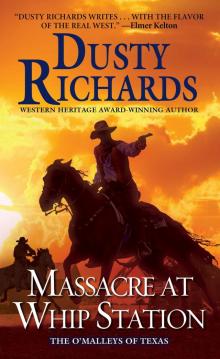 Massacre at Whip Station
Massacre at Whip Station Blue Roan Colt
Blue Roan Colt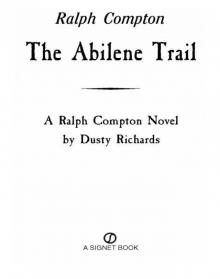 The Abilene Trail
The Abilene Trail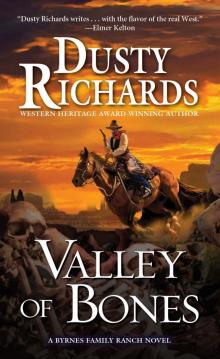 Valley of Bones
Valley of Bones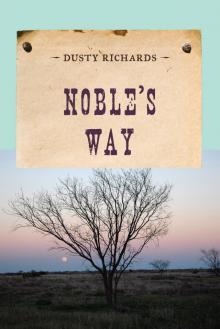 Noble's Way
Noble's Way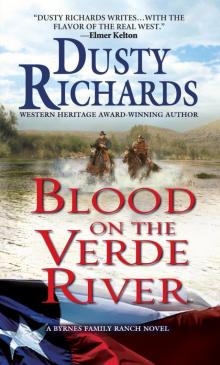 Blood on the Verde River
Blood on the Verde River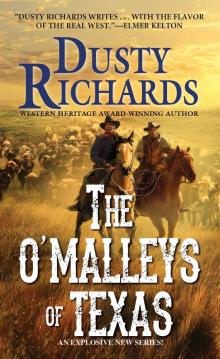 The O'Malleys of Texas
The O'Malleys of Texas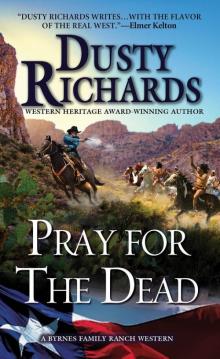 Pray for the Dead
Pray for the Dead Arizona Territory
Arizona Territory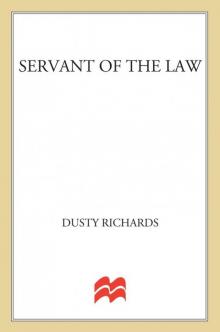 Servant of the Law
Servant of the Law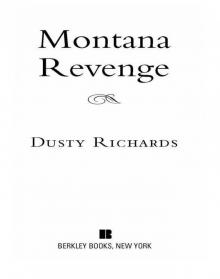 Montana Revenge
Montana Revenge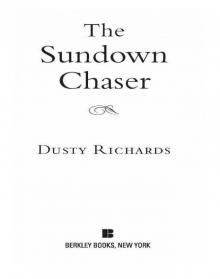 The Sundown Chaser
The Sundown Chaser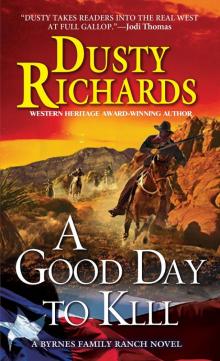 A Good Day To Kill
A Good Day To Kill Deuces Wild
Deuces Wild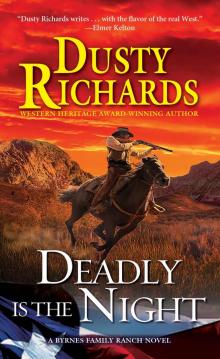 Deadly Is the Night
Deadly Is the Night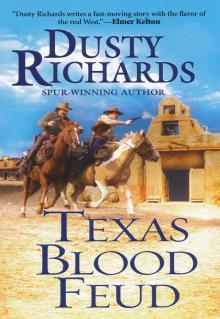 Texas Blood Feud
Texas Blood Feud Wulf's Tracks
Wulf's Tracks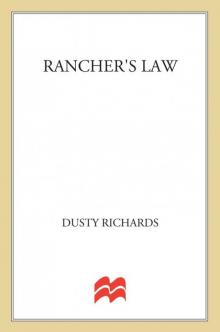 Rancher's Law
Rancher's Law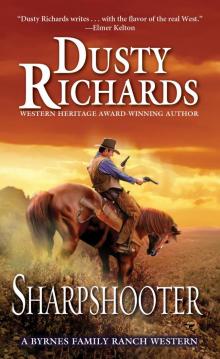 Sharpshooter
Sharpshooter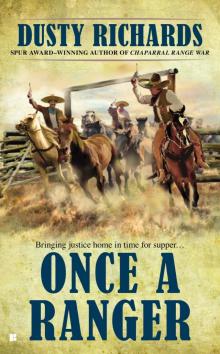 Once a Ranger
Once a Ranger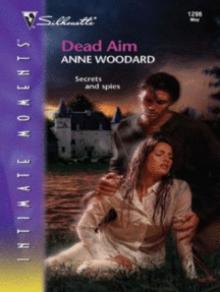 Dead Aim
Dead Aim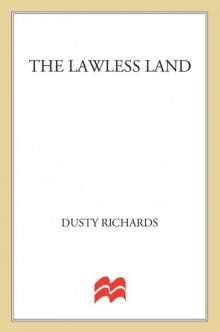 Lawless Land
Lawless Land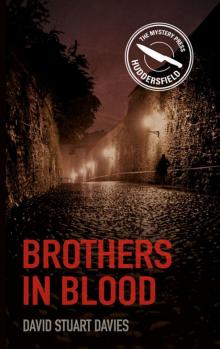 Brothers in Blood
Brothers in Blood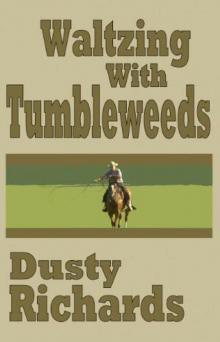 Waltzing With Tumbleweeds
Waltzing With Tumbleweeds